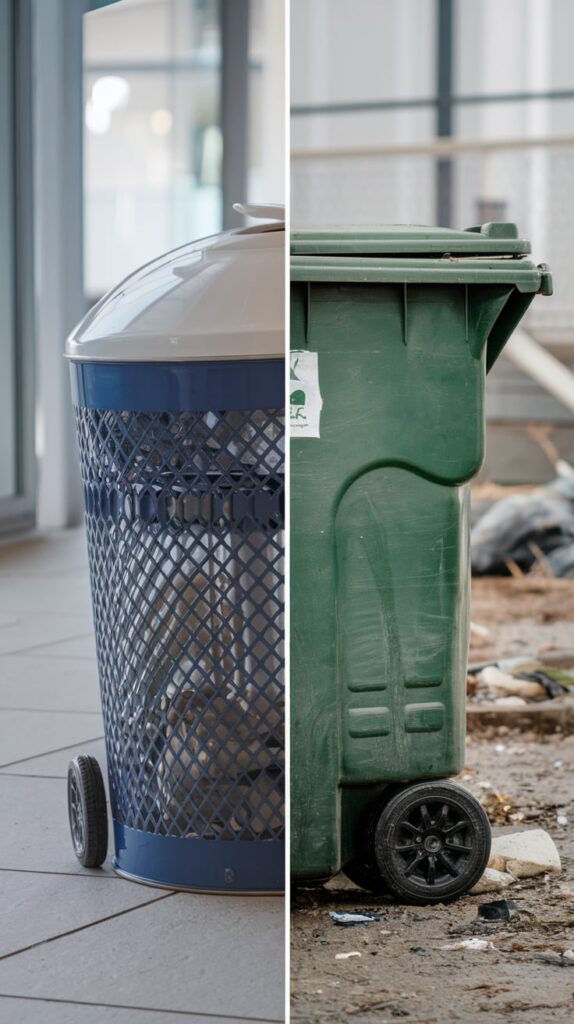When it comes to waste management, the terms trash and garbage often get thrown around as if they’re interchangeable. However, understanding the nuances between trash vs garbage
can have significant implications for both our environment and how we communicate about waste. In this comprehensive guide, we’ll explore the definitions of these terms, their origins, their impact on the environment, and the proper disposal methods.
By the end, you’ll have a clearer understanding of what is trash and what is garbage, empowering you to make informed choices in waste management.
read more : Ethos in Literature – Grammar Beacon
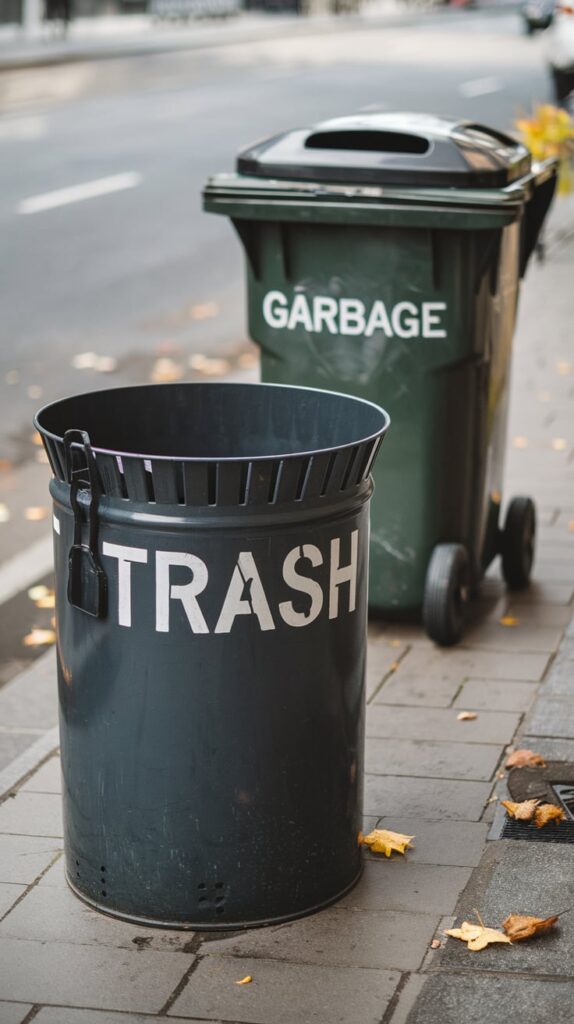
What is “Trash”?
Definition of Trash
Trash refers to non-organic, non-biodegradable waste. These are items that don’t break down easily in the environment and can remain for years or even centuries. Typically, trash is made up of materials that are not recyclable or compostable.
Common Examples of Trash
Plastics: This includes items like water bottles, straws, and plastic bags. A staggering amount of plastic ends up in landfills each year, contributing to significant environmental issues.
Metals: Aluminum cans, tin foil, and other metal products that can’t be recycled or reused often become trash.
Glass: Broken bottles and jars that are not collected for recycling also contribute to the trash pile.
The Challenge of Trash
One of the biggest challenges with trash is its contribution to landfill overflow. In the United States alone, landfills are filling up rapidly, and new sites are becoming increasingly difficult to find.
This situation underscores the need for better waste management practices and heightened awareness around recycling and reduction strategies.
read more : End Rhyme examples in Poetry – Grammar Beacon
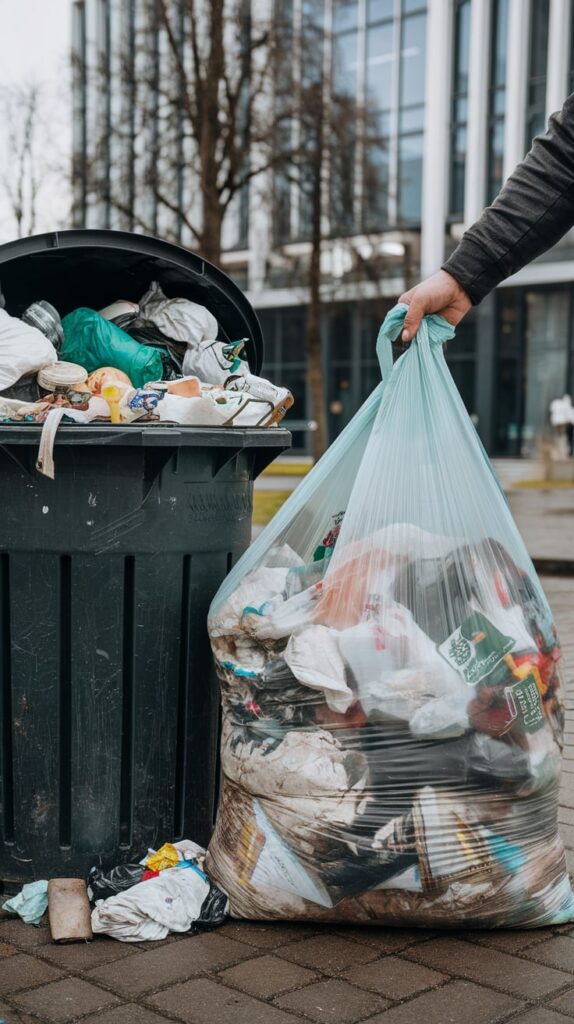
What is “Garbage”?
Definition of Garbage
In contrast, garbage refers to organic, biodegradable waste. These materials can decompose naturally and typically include items that come from food sources and yard waste.
Common Examples of Garbage
Food Scraps: This includes leftover vegetables, fruit peels, and uneaten meals. Instead of throwing these away, they can be composted to enrich the soil.
Yard Waste: Grass clippings, leaves, and branches fall into this category and can be transformed into mulch or compost.
Spoiled Food: Anything that has gone bad, such as expired dairy products or moldy bread, is considered garbage.
Benefits of Garbage
The main benefit of garbage is its ability to return nutrients to the earth. When managed correctly, organic waste can be composted, reducing landfill waste and supporting sustainable agriculture.
read more : Simile and Metaphor – Grammar Beacon
“Trash” vs “Garbage”: The Differences
Understanding the distinctions between trash vs garbage is essential for effective communication about waste management.
Type of Waste
Trash: Comprised of non-organic materials such as plastics, metals, and glass. These items do not break down easily and pose long-term environmental challenges.
Garbage: Made up of organic materials that decompose, such as food scraps and yard waste. This type of waste can enrich the soil when properly managed.
Disposal Methods
Trash Disposal: Typically sent to landfills, incinerated, or sometimes recycled. Unfortunately, a large portion of trash ends up in landfills, contributing to environmental pollution.
Garbage Disposal: Generally composted or processed to recycle nutrients. Municipal composting programs help divert organic waste from landfills.

Environmental Impact
The Environmental Challenges of Trash
The environmental impact of trash is significant. Items like plastics can take hundreds of years to decompose, causing pollution and harming wildlife.
For example, plastic bags can entangle marine life, while microplastics can enter the food chain, posing risks to human health.
read more : Or vs Nor – Grammar Beacon
Landfills and Pollution
Landfills are a significant source of environmental pollution. As trash decomposes, it releases methane, a potent greenhouse gas that contributes to climate change.
Additionally, toxins from the waste can leach into groundwater, contaminating drinking supplies.
The Environmental Benefits of Garbage
In contrast, garbage can positively impact the environment when composted. This practice not only improves soil health but also supports biodiversity by attracting beneficial organisms.
Common Usage of Trash and Garbage
In everyday conversation, many people use the terms trash and garbage interchangeably, which can lead to misunderstandings.
Clarifying Common Usage
Trash: A broad term that encompasses a variety of discarded items, including recyclables and non-recyclables.
Garbage: Specifically refers to organic, decomposable waste.
Illustrative Scenarios
Let’s say you’re at a family barbecue. After enjoying your meal, you might have leftover food scraps—that’s garbage. But the plastic wrapping from your burgers? That’s trash. Knowing the difference can help you sort your waste correctly.
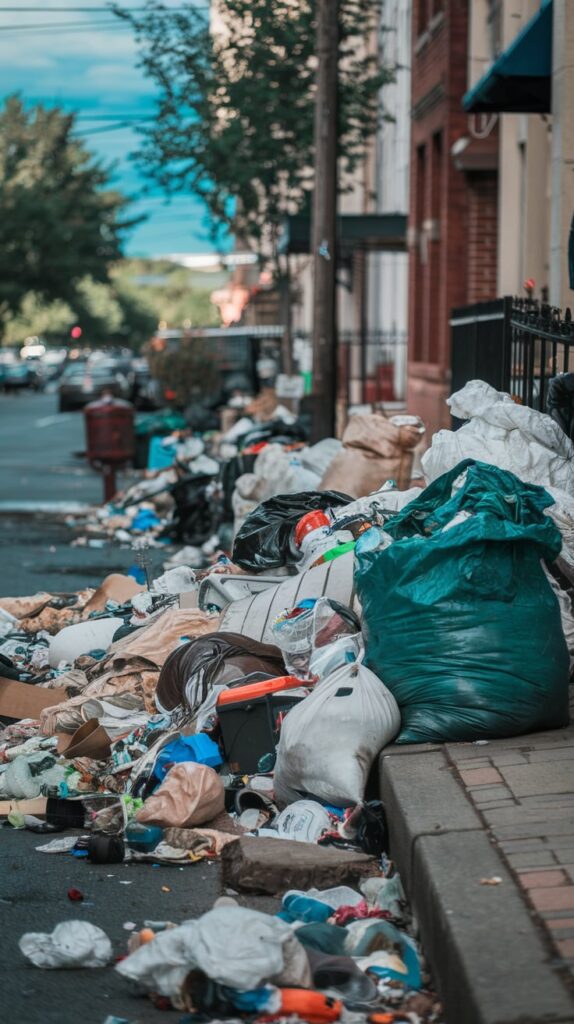
Types of Waste
To further clarify the distinction between trash vs garbage, it’s helpful to categorize types of waste.
Non-Organic Waste (Trash)
Plastics: Bags, bottles, and packaging materials that can’t be recycled.
Metals: Non-recyclable metal products that end up in landfills.
Glass: Broken or non-recyclable glass items that contribute to trash.
Organic Waste (Garbage)
Food Scraps: Any leftover food that can decompose.
Yard Waste: Leaves, branches, and other organic materials from landscaping.
Paper: Certain types of paper, particularly if contaminated with food, may be considered garbage.
Disposal Methods
The disposal methods for trash vs garbage differ significantly and have varying impacts on the environment.
Trash Disposal Methods
Landfills: The most common method, where trash accumulates, leading to long-term environmental challenges.
Recycling: Some trash can be recycled, reducing the demand for new materials and conserving resources.
Incineration: Burning trash to reduce volume, but this can release harmful pollutants into the atmosphere.
Garbage Disposal Methods
Composting: This method involves turning food scraps and organic waste into valuable compost that enriches the soil.
Municipal Composting Programs: Many cities have programs to collect organic waste for composting, promoting sustainability and reducing landfill contributions.
Anaerobic Digestion: This process breaks down organic material in the absence of oxygen, producing biogas that can be used for energy.
Environmental Impact of Waste
The environmental implications of trash vs garbage are critical for understanding the broader impact of waste management practices.
Trash
The negative impact of trash is far-reaching. Items like plastics not only pollute the landscape but also contribute to climate change through the release of greenhouse gases in landfills.
Furthermore, the leaching of toxic substances into groundwater from landfills poses significant health risks.
Garbage
Garbage, when handled properly, can benefit the environment. Composting organic waste helps reduce landfill contributions and recycles nutrients back into the earth, promoting soil health.
This process supports plant growth and mitigates the need for chemical fertilizers.
Origins of the Words “Trash” and “Garbage”
Understanding the etymology of these terms adds an interesting dimension to their meanings.
Origins of the Word “Trash”
The word trash has roots dating back to the 1400s, initially referring to fallen leaves and worthless items. Its origins can be traced to Scandinavian languages, specifically the Old Norse word “tros,” signifying something of little value.
Origins of the Word “Garbage”
The term garbage emerged in the early 15th century, originally referring to waste materials from animals. Its evolution from Anglo-French origins illustrates how language adapts to cultural and societal changes.
The Role of Waste Management
Importance of Waste Management
Understanding the difference between trash vs garbage is essential for effective waste management. By categorizing waste properly, we can implement better disposal methods and promote recycling and composting.
Community Initiatives
Many communities are adopting innovative waste management practices to address the challenges of trash and garbage. From local recycling programs to educational initiatives, raising awareness about waste can lead to significant changes in behavior and attitudes toward waste disposal.
Practical Tips for Managing Trash and Garbage
Reduce, Reuse, Recycle
Adopting the 3 R’s—reduce, reuse, and recycle—can make a significant difference in how we manage trash and garbage.
Reduce: Minimize the amount of waste you produce by opting for products with less packaging.
Reuse: Find new uses for items instead of throwing them away. For example, glass jars can be used for storage.
Recycle: Participate in your local recycling program to ensure that recyclable materials are processed correctly.
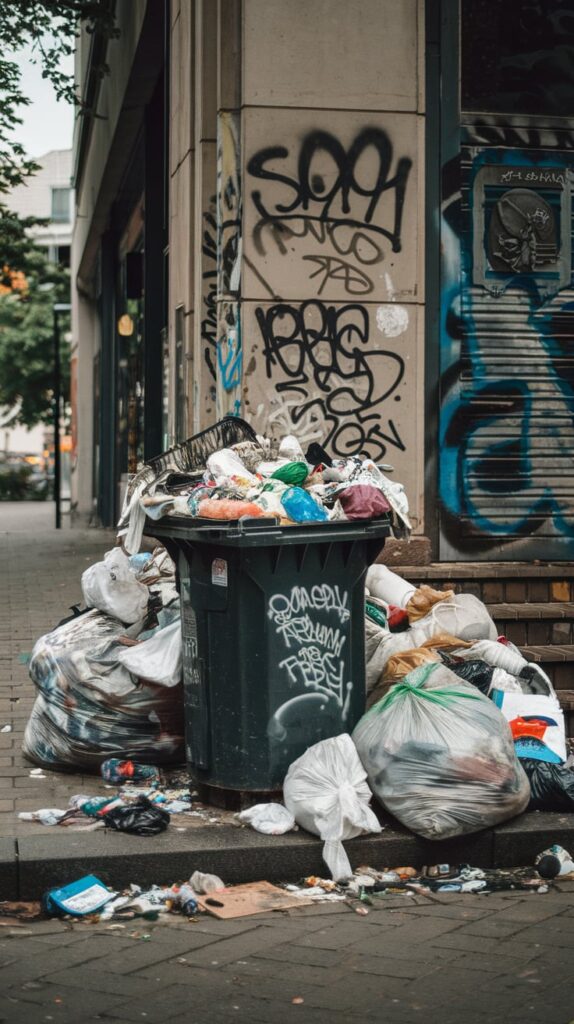
Composting at Home
Composting is an effective way to manage garbage. Here’s how to get started:
Choose a Compost Bin: Select a bin or area in your yard for composting.
Collect Organic Waste: Gather food scraps, yard waste, and other compostable materials.
Maintain Your Compost: Turn the compost regularly to aerate it and speed up the decomposition process.
Educate Others
Spread awareness about the differences between trash and garbage. Educating friends and family can lead to a collective effort to reduce waste and manage it responsibly.
The Future of Waste Management
Innovations in Waste Management
As the world faces increasing waste challenges, innovative solutions are emerging
. Technologies such as waste-to-energy plants and advanced recycling systems offer promising alternatives for managing both trash and garbage.
Sustainable Practices
Promoting sustainability in waste management is essential. Communities are increasingly adopting practices that prioritize composting, recycling, and waste reduction to create a cleaner, healthier environment.
Conclusion
In conclusion, understanding the differences between trash vs garbage is crucial for effective waste management and environmental awareness. By recognizing what constitutes trash and what qualifies as garbage,
you can make informed choices that benefit the planet. Whether it’s composting your organic waste or recycling your plastics, every small action contributes to a healthier environment.
Final Thoughts
The next time you toss something in the bin, take a moment to consider whether it’s trash or garbage. Your choices matter, and they can significantly impact our environment.
By adopting better waste management practices and promoting awareness, we can all contribute to a sustainable future.
Sources
By staying informed and proactive, we can work towards a cleaner, more sustainable world.

James Logan is a seasoned blogger and language enthusiast behind Grammar Beacon. With years of experience in grammar and writing, James shares his expertise through insightful and engaging content. His passion for clear communication and linguistic precision shines in every post, making complex grammar concepts accessible and enjoyable for readers. Follow James for expert advice and tips to refine your writing skills.

